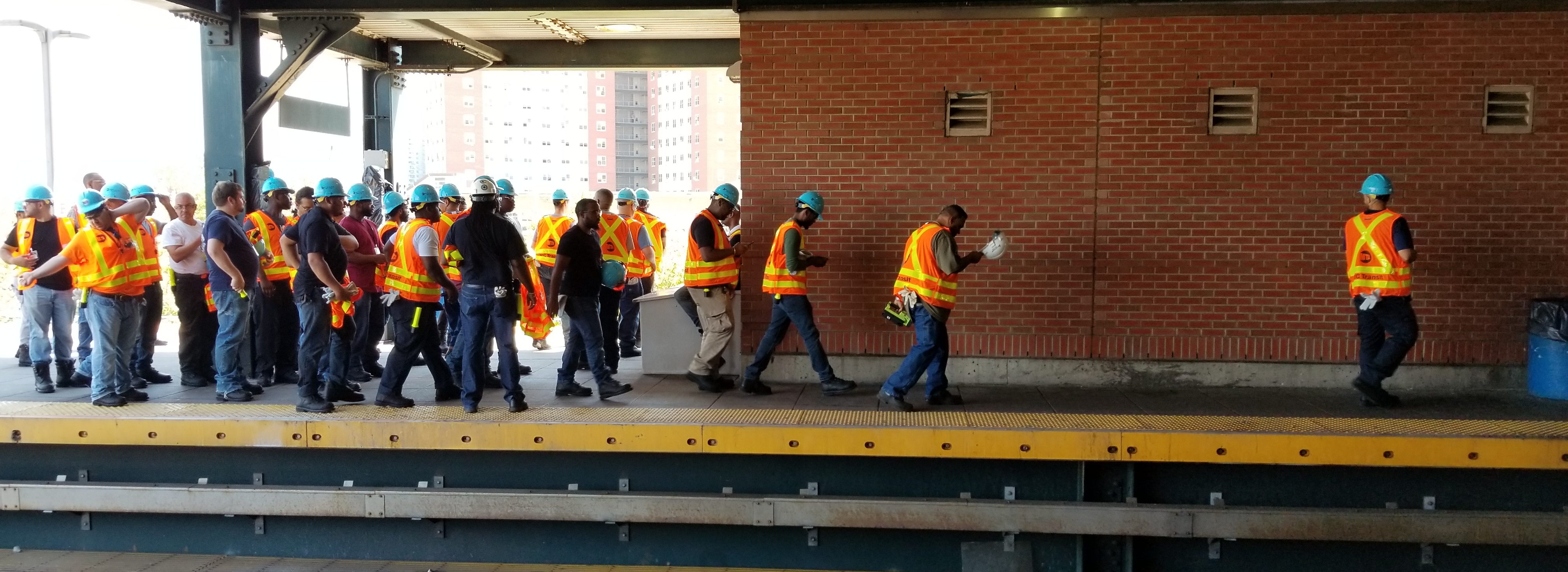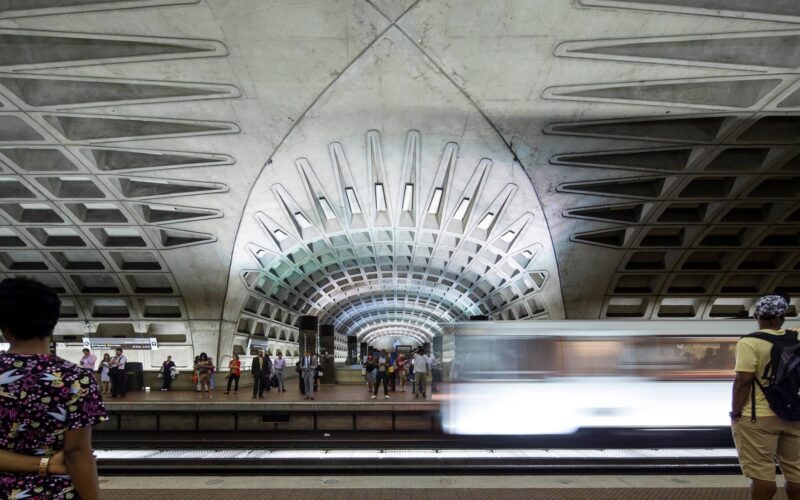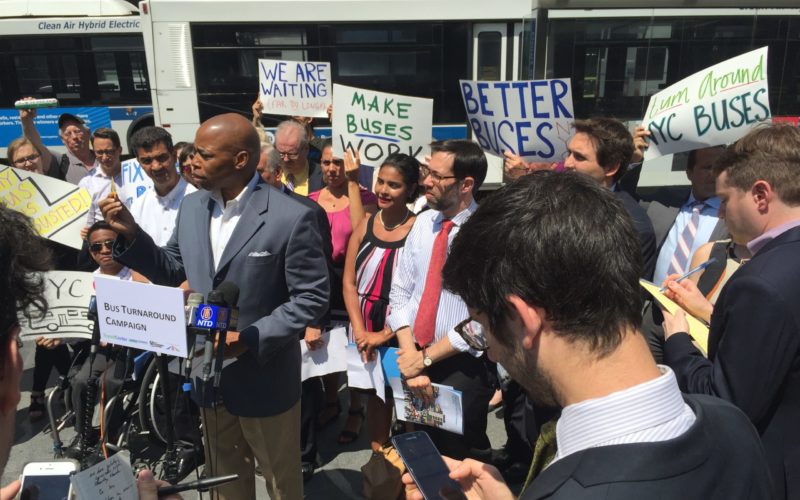
The consensus to tolerate sky-high New York transit construction costs runs deep.
It’s been little more than a month since publication of the New York Times exposé “The Most Expensive Mile of Subway Track on Earth.” But the constant political drama around transit funding in New York, Governor Cuomo’s proposal for congestion pricing, the revelation that the MTA cooked the books on electricity-related subway problems and more may make it seem longer ago.
The Times investigation remains a game-changer. With the urgent need to rebuild and improve the NYC subway, new transit funding sources being debated daily, and Governor Cuomo proposing congestion pricing, the issue of why New York pays construction costs that may be several times those of comparable systems is not going away. It is likely to make raising new revenue more difficult, unless MTA leadership can show prompt action on cost reform.
Whenever transit funding is broached, it’s now an open and legitimate question how much of taxpayers and riders’ money will be spent on transit improvements and how much is devoted to the “New York premium” of unnecessary labor costs and huge mark-ups for consultants like Parsons-Brinckerhoff.
The MTA board has launched a task force on procurement to recommend reforms. But the consensus across New York officialdom to tolerate inflated costs runs deep.
Consider the 23 quotes contained in the NY Times article: The expert sources who do not have a financial reliance on the MTA and are experienced in other comparable cities are unanimous in their scathing assessment of excessive costs in New York. By contrast, most of the sources based in New York are defensive and evasive. Not a single New Yorker in any position of authority – even the minority who openly acknowledge a problem – is quoted proposing remedies.
What the NYC-based sources say:
The best defense is offense
- Gary LaBarbera, President of Building and Construction Trades Council of Greater New York: New York is “expensive,” and construction workers “deserve every penny they make, and more.”
- Denise Richardson, General Contractors Association of NY: surcharges “are needed.” No explanation cited for why they are at such enormous variance with peer cities.
We don’t want to talk about it
- Governor Cuomo’s office, which controls the MTA and in the past has dictated minute details of MTA management’s negotiating terms with labor: Peter Ajemian refuses to comment.
- Unnamed MTA officials: decline to comment on why Paris subway accomplishes so much more at far lower costs.
- WSP, former Parsons Brinckerhoff, firm with major MTA contracts: Offers platitudes, declines to comment on specifics.
- Anil Parikh, former MTA employee and current consultant who received personal benefits from a vendor: declines to comment.
Passive “recognizers” who see but don’t act
- Joe Lhota: quoted as saying MTA leadership recognizes cost “has been a problem” and needs to be “addressed” and “attacked.” As recently as October 2017 Lhota had released a letter defending high MTA costs. Lhota’s ten “explanations” are debunked throughout the Times account.
- Michael Horodniceanu: describes accountant’s “discovery” of 900 workers being paid to do the work of 700, and the layoff of the excess 200, who were being paid $1,000 per day. He admits nobody could figure how long they had been there. No mention of any discipline or remedial action taken to prevent re-occurrence.
- Charles Moerdler, MTA board member: “Is it rigged? Yes.” But Moerdler does not point to anything he has proposed to reform the system in the seven years he has been on the board.
We’ll be frank, because we’re out of there, or anonymous
- Tim Gilchrist, past advisor to prior Governors Spitzer and Paterson: observes that contracting structure excludes taxpayers’ and fare-payers’ interests: “Nobody at the negotiating table is footing the bill.”
- Mysore Nagaraja, former head of MTA Capital Construction on the “MTA factor” in bids: “It adds up.” No explanation for whether the premiums are justified.
- Larry Gould, former MTA employee now at Nelson/Nygaard planning firm: “crazy” that MTA soft costs are “so high.”
- Unnamed MTA contractors: admit to adding a premium of 15-25% to costs because of “how hard it can be” to work with the MTA.
Light in the Tunnel? Two lonely New Yorkers are open to unspecified change
- Janno Lieber, MTA overseer of construction appointed in 2017: acknowledges problem, calls system “broken,” says, “We just have to do a much better job” reducing soft costs.
- Richard Fitzsimmons, business manager, Local 147: admits he often sees construction companies requiring more workers than truly needed. Expresses willingness to “figure out a way” to improve situation.
What the non-NYC sources say:
Astounded private sector professionals:
- Lok Home, Robbins Company, tunnel boring contractor, based in Ohio: labels the NYC situation sad, says if MTA controlled costs “they could do twice as many expansion projects and still have more money for maintenance.”
- Rob Muley, John Holland Engineering, Melbourne, Australia: Lhota’s excuses “sound like cop-outs.”
- Mike Roach, California-based tunneling contractor: is “stunned” and “surprised” at observing that an MTA project uses “three times [the number of workers] I’m used to.”
- Jim Peregoy, cost estimator based in Missouri who has worked in 27 states, including on the first phase of the Second Avenue subway in NYC: “amazing” that the labor unions “dictate everything that happens on a job in New York.”
- Gary Brierley, tunnel consultant based in Denver: other than in NYC, agencies receive eight bids from different companies, but in NYC, “you get two or three…so they’ll inflate their bids if they think they can get away with it.”
- Jack Brockway, executive at Herrenknecht, manufacturer of tunneling equipment, Germany: “skeptical” of value of MTA supervisory consultants, whose instructions “barely made sense.”
Sober academic analysts
- David Schleicher, Yale University: unequivocal that NYC is “glaring exception” to international norms.
- Alon Levy, writer and expert not based in New York: provides detailed comparative critiques of multiple cities, documenting the wide gap between NYC and everywhere else.
Polite public transit officials who would never do it the NYC way
- Andy Mitchell, former head of London’s Crossrail project. Incredulous that “age of the city” is an excuse used by MTA officials.
- Laurent Probst, managing director of Paris transit agency: cites number of workers in Paris, for the Times to compare to much larger number doing similar work in NYC. MTA declines to comment on the comparison.
- Isabelle Brochard, with Parisian transit operating company: cites number of workers in Paris, for the Times to compare to much larger number doing similar work in NYC. MTA declines to comment on the comparison.
The lonely consulting firm whose private honesty was outed
- Arup, international consulting firm that has a NYC office and does business with the MTA, says in an internal report: MTA “underground construction employs approximately four times the number of personnel as in similar jobs in Asia, Australia and Europe.”
The fog of excuses and denial from nearly all the New Yorkers quoted is ultimately the most damning revelation of the whole story. Without change in those attitudes, reinforced by policy action by the MTA — and perhaps by the Legislature and State Comptroller Thomas DiNapoli — New Yorkers will continue to get much less for their transit dollars than they deserve, and than is sorely needed by the transit system itself.
 On the Brink: Will WMATA’s Progress Be Erased by 2024?
On the Brink: Will WMATA’s Progress Be Erased by 2024?
The experience of being a WMATA rider has substantially improved over the last 18 months, thanks to changes the agency has made like adding off-peak service and simplifying fares. Things are about to get even better with the launch of all-door boarding later this fall, overnight bus service on some lines starting in December, and an ambitious plan to redesign the Metrobus network. But all of this could go away by July 1, 2024.
Read More A Bus Agenda for New York City Mayor Eric Adams
A Bus Agenda for New York City Mayor Eric Adams
To create the “state-of-the-art bus transit system” of his campaign platform, Mayor Adams will have to both expand the quantity and improve the quality of bus lanes. We recommend these strategies to get it done.
Read More